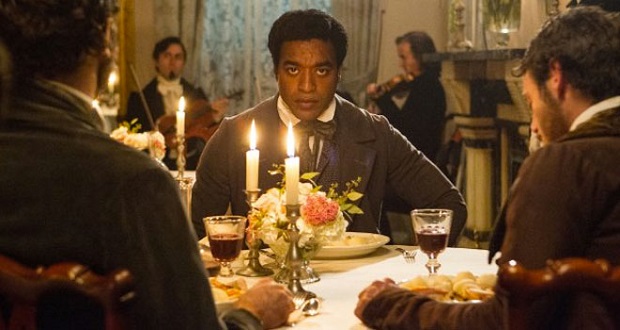by Keith H. Earley

Image source: Fox Searchlight Pictures
If you haven’t seen 12 Years A Slave, I urge you to do so at your earliest opportunity. I also encourage you to go with someone or a group. You’ll want to talk about the movie afterward. At every level, the movie is compelling. Finally, there is a story about the slave experience that unflinchingly depicts the horror, brutality and emotional toll it exacted. It’s the kind of movie that you can’t stop thinking about for hours, perhaps days, after it ends.
12 Years A Slave is a genre breaking experience that really is unlike anything I’ve seen. Roots was ground breaking when it aired over 35 years ago and its impact on our collective psyche was profound. Other cinematic treatments of slavery were narrowly focused on aspects of slavery (Amistad) or highly stylized (Django Unchained). None of these come close to providing the intimate connection to the slave experience captured by12 Years. It is a movie that is at once, unvarnished yet nuanced, offering blunt brutality and tender moments. It allows the audience to rejoice one moment and experience wrenching pain the next. It captures the complexities of slavery from the perspectives of slaves and whites without reducing either to caricature. Even the moments of catharsis are offset with uncertainty about the implications for the principal or secondary protagonists.
Although 12 Years is based on a specific individual’s story, there are multiple stories about other characters that give you a broader sense of the many ways slavery was a crime against humanity. It is hard to watch and violent. But the violence, while graphic, is not gratuitous. 12 Years is a complex, textured movie in which every major story line has a counter story. For every fleeting moment of satisfaction or hope, there is frustration, anger and palpable loss. Even the cinematography conveys tension arising from seductive scenes of beauty and serenity offered as a counterpoint to the hellish horror that the slaves had to endure.
Personally, the movie was so visceral that it seemed to reach into the deepest part of me and expose innermost feelings that spanned a full range of feelings–anger, disgust, despair, profound sadness and ultimately joy. These feelings were confirmed by audible reactions from others in the audience throughout the movie.
In short, 12 Years is a demanding movie. Although it is exceptionally thought provoking, you cannot watch it merely as an intellectual exercise. Whether you like it or not, you are forced to experience it with your heart and your soul.
There are so many astonishing performances it’s impossible to see how 12 Years will not win many major awards. Chiwetel Ejiofor is incredible as Solomon Northrup (later Platt). His ability to convey the deepest pain created physical sensations for me. At times this was done without words and without the background music that manufactures emotion. Lupita Nyong’o (as Patsey)—the recipient of wretched excesses from both the plantation master Michael Fassbender (as Epps) and Sarah Paulson (his wife)—opens her soul so completely that my eyes welled up with tears with each outrage. It’s difficult to imagine a more urgent and eloquent rendering of the impact of tearing children from a mother’s arms as portrayed by Adepero Oduye as Eliza. Performances by the beneficiaries of slavery (the sellers, plantation owners and particularly Mrs. Epps) are also extremely well done. Thus, a tapestry is created that is no less emotionally intense than Schindler’s List–the only movie I can think of that is comparable. But this is about the African-American holocaust. It makes all other movies about that shameful American episode seem woefully tepid and inert.
12 Years is an educational experience as well. Whatever I thought I knew somehow didn’t prepare me for the excruciatingly intimate experience of this particular story. It also goes a long way in answering the question of why an understanding of slavery is relevant today. One of the unstated subtexts of the movie is that wealth and privilege today are inextricably linked to slavery. Another examines the roots of internalized oppression as we see a range of interactions among blacks. Ultimately, as black people, the movie conveys a message of survival—as difficult and hopeless as it must have seemed. Survival is not to be equated with a happy ending. It is for Solomon, a matter of accommodation, sacrifice and compromised dignity. But survival has contemporary implications. The mere fact that we can watch 12 Years one hundred sixty years after the portrayed events is a powerful testament to all that our ancestors did to allow us to be here. Finally, it is worth noting that a black man from Great Britain directed the movie. I can’t help but wonder why it is that no American, white or black, was able to take on such a quintessentially American subject.
These are but a few of the lessons that can be taken from 12 Years. They provide a foundation for discussions that all people should embrace. Despite its challenges, 12 Years is an excellent tool to help address our discomfort and incompetence with discussions of racism and oppression.
12 Years is more than an important movie. As one critic wrote, it is essential cinema. It will be interesting to see if this movie becomes a commercial success. Will whites see it or avoid it? I hope it’s the former.
[author image=”https://theinclusionsolution.me/wp-content/uploads/2013/10/Keith-Earley.png” ]Keith H. Earley is an organization development consultant with a broad range of corporate experience in change management, executive coaching, diversity and inclusion strategies, team building and group facilitation. Formerly the director of Diversity & Inclusion at Finnegan, Henderson, Farabow, Garrett & Dunner, a global firm specializing in intellectual property law, Keith is currently working on his PhD in Human & Organization Development at Fielding Graduate University. [/author]

















